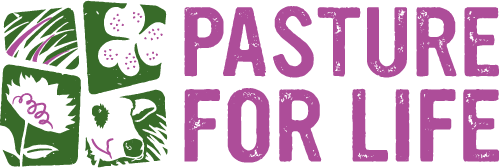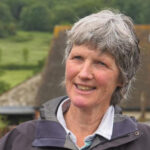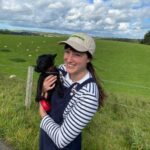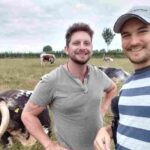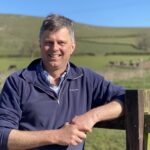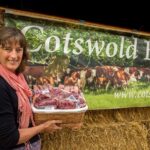Farmer-to-farmer webinars
We've developed a program of expert-led farmer to farmer online workshops.
The aim of these webinars is to enable farmers to identify what changes and adaptations they can make to build resilience into their farm businesses. The webinars also provide a crucial space for farmers to meet, and be supported in building peer-to-peer networks.
The webinars are all free to attend, please sign up to the program to gain access to the sessions.
- Andy Rumming
- Fidelity Weston
- Annie Landless
- Nick Green
- Silas Hedley-Lawrence
- Rebecca Mayhew
- Angus Dalton
- Denise Walton
- Cathy Boyd
Local markets and direct marketing Part 1: Meat and Dairy: Set-up, Sales & Marketing
Wednesday 6th October, 4pm – 6pm.
Speakers: Annie Landless (Chair), Bill Biddell, Cathy & Steph Boyd, Fidelity Weston
This first session on meat & dairy will focus on set up and outreach and will be chaired by Annie Landless who has just completed a wide review of direct sales for the PFLA. Annie will start with her conclusions from the overall project and a discussion of the main pathways to a successful outcome. What issues should livestock farmers be thinking about when considering direct sales or local marketing? Our four farmer panellists will be on hand with their insights as we discuss each of the main areas new entrants should be thinking about: finding customers, taking orders, fulfillment, regulation. The panel will also discuss how they adapted from their first ideas to where they are now. There will be plenty of time for Q&A for Annie and the panellists on each subject.
Local markets and direct marketing Part 2: Meat: Slaughter, Butchery and Packing
Thursday 14th October, 4pm-6pm
Speakers: Annie Landless (Chair), Andy Rumming, Silas Hedley-Lawrence, Denise Walton, Nick Green
This session will focus on the important mechanics of moving from animals in a field to meat in customers’ hands and will be chaired by Annie Landless who has just completed a wide review of direct sales for the PFLA. The devil is in the detail and our experienced panel of four will offer their insights into each of the challenges of finishing, slaughter, butchery, processing and packing in succession. The panel will also discuss how they adapted from their first ideas to where they are now. There will be plenty of time for Q&A for Annie and the panellists on each subject.
Local markets and direct marketing Part 3: Dairy: Processing, Packaging and Selling
Wednesday 20th October, 4pm – 6pm
Speakers: Annie Landless (Chair), Angus Dalton, Rebecca Mayhew, David & Wilma Finlay and Jonny Crickmore
This session will focus on direct sales of dairy products and will be chaired by Annie Landless who has just completed a wide review of direct sales for the PFLA. Focusing primarily on liquid milk, although with reference to other finished products like butter and cheese, our experienced panel of farmers will offer their insights into the challenges of pasteurising, processing, packaging and sales, including novel routes to market such as vending machines. The panel will also discuss how they adapted from their first ideas to where they are now. There will be plenty of time for Q&A for Annie and the panellists on each subject.
Local markets and direct marketing Part 4: Arable crops in mixed system
Wednesday 27th October, 4pm – 6pm
Speakers: Hodmedods
While most arable crops are sold on the commodity market, there is an increasing demand for short supply chains and directly sold pulses and grains. This webinar explores this growing market and looks at the supply chain requirements in order to sell direct to this market.
Local markets and direct marketing Part 5: Horticulture
Wednesday 3rd November, 4pm – 6pm
Speakers: Iain Tolhurst
This webinar will explore local markets and short supply chain systems for horticulture growers. We will look at different models of direct selling including farm shops, farmers markets and box schemes. We’ll also look at short supply chain wholesale such as cafes and restaurants, hospitality, food hubs and local and independent shops.
Soil health Part 1: the foundation of agroecological systems
Wednesday 10th November, 4pm – 6pm
Speakers: Elizabeth Stockdale
This session will look at how good soil health is central to on farm resilience, creating better drainage and water retention and mitigating the impact of climate change. There will be a practical focus on how to build soil organic matter and we’ll look at the vital role of PP / perennials in soil protection and the damaging effect of ploughing.
Soil health Part 2: how to receive payments for Sustainable Farming Incentive for soil standards
Wednesday 17th November, 4pm – 6pm
Speakers: Jenny Phelps
This session will be a ‘how to’ guide for getting payments from the Sustainable Farming Incentive for soil standards using practical management methods such as mixed herbal leys.
Diverse cropping – Diversity at the heart of agroecological system
Thursday 25th November, 4pm – 6pm
Speakers: Organic Research Centre
Diversity is at the heart of any agroecological system. In this session we will be looking at this core principle and how on farm diversity limits pesticide use, supports soil health, mitigates climate change and ultimately contributing to overall farm resilience.
Recycling Fertility Part 1: fertility building in rotation without animals
Wednesday 1st December, 4pm – 6pm
Speaker: Iain Tolhurst
In this webinar we focus on specialist horticulture and the benefits of crop rotations and recycling green manure to build fertility without using synthetic fertiliser.
Recycling Fertility Part 2: fertility building in rotation with animals
Date and speakers TBC
In Recycling Fertility Part 2, we look at how to create balanced systems and build fertility in mixed arable and livestock rotations, including ruminants, pigs and poultry.
Recycling Fertility Part 3: How are farmers composting manure and reusing it on land?
Date and speakers TBC
In this session we look at ways to alleviate slurry by creating compost from farm yard manure that can be spread on the land and be an additional source of income. We’ll also look at how compost contributes to climate change mitigation and provide a brief overview of solutions to slurry disposal costs.
Recycling Fertility Part 4: Farmers working together in the local area
Date and speakers TBC
This week we are joining a panel of local farmers that work together in a local area to create and share compost. They will discuss their processes and how creating a circular system is mutually beneficial to all involved. might have to be expert saying this is why this is great idea and why and how it would work.
Integrated pest management Part 1
Date and speakers TBC
This session looks at how integrated pest management systems limit pesticide use, helping to improve soil health, mitigate climate change and ultimately contributing to overall farm resilience.
Integrated pest management Part 2: disease resistance
Date and speakers TBC
This webinar looks at how the right varieties of plants and hardy livestock breeds make them disease resistant and how as a result they play an important part in integrated pest management systems.
Pasture Management Part 1: Maximising grass and increasing sward diversity
Date and speakers TBC
Both these webinars will be looking at how to manage your grassland system to minimise other input costs such as nitrogen fertilisers and housing. In Part 1, we will be looking at how to increase your forage production and pasture diversity without synthetic inputs.
Pasture Management Part 2: Extending the grazing season
Date and speakers TBC
Both these webinars will be looking at how to manage your grassland system to minimise other input costs such as nitrogen fertilisers and housing. In Part 2, we’ll be exploring practical steps towards extending your grazing season and the benefits of out-wintering your herd
Reducing inputs in grazing systems Part 1: reducing supplementary feeding
Date and speakers TBC
Both these webinars will look at how changes in management practices can reduce inputs and lower your running costs. The focus of Part 1 will look at how changing your grazing practices can reduce the need for bought-in grain and concentrates.
Feed inputs into the pasture farming system Part 2: reducing the need for antibiotic and anthelmintic usage
Date and speakers TBC
Both these webinars will look at how changes in management practices can reduce inputs and lower your running costs. The focus of Part 2 will be on how management and switching to resilient breeds can lower antibiotic and anthelmintic usage and reduce your medical vet bills.
Integrating trees
Date and speakers TBC
This session will look at how you can integrate trees into your farming system including on farm woodland and hedgerow management and agroforestry. We’ll also be looking at how to leverage payments on farm trees and how to access carbon payments.
